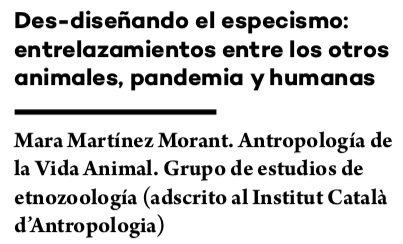De-designing speciesism: entanglements between the other animals, pandemic and humans
DOI:
https://doi.org/10.46516/inmaterial.v6.135Keywords:
speciesism, zoonoses, covid-19, rewalding, total releaseAbstract
During this global Covid-19 pandemic, probably caused by the exploitation of other animals, humanity's relationship with other species continues practically unchanged, for example, meat continues its unstoppable sales rhythm. What makes it possible for most humans to continue their daily lives normally instead of questioning their relationship or use of non-human animals? Without a doubt, that social construction called speciesism. Speciesism is defined as the assumption of human superiority over other living individuals, leading to the exploitation of other animals. It is a bias that spreads across different cultures and makes humans unable or unwilling to connect animal exploitation with the resulting consequences, including the current catastrophe. Diseases that originate in animals, called zoonoses, have caused almost all pandemics in human history. However, this causal relationship is largely relegated to scientific and activist discussions that have not yet permeated the collective debate. The widespread reluctance to examine the cause or root of the pandemic is creating a disconnection in the prevailing discourse.
With this research we begin the itinerary to establish a tentacular discourse of a socio-scientific nature, based on the documentary analysis that will allow us, in a second stage, to carry out ethnography about the importance of other animals in human life. The initial purpose is, therefore, to document processes that show how speciesism naturalizes the use and exploitation of other animals, showing that zoonotic pathogens, which are described as jumping to humans due to contact or mixing with other animals, they are the excuse to neutralize the human role and exempt it from its responsibility, threatening, in turn, its exploitative nature.
Downloads

Published
How to Cite
Issue
Section
License
Copyright (c) 2021 Mara Martínez Morant (colectivo AVA)

This work is licensed under a Creative Commons Attribution-ShareAlike 4.0 International License.






